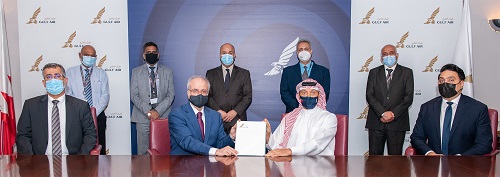Manama: For the first time in the national carrier of the Kingdom of Bahrain’s history, Gulf Air has successfully completed a 100% virtual business continuity management drill. The exercise was planned for the most critical business functions to assess the airline’s readiness to continue operations in the event of unforeseen situations or emergencies.
The exercise was conducted on the actual airline operations last month by adapting ‘Work from Home’ model. The recovery teams that were working from home, assumed full control of operations, took over from the headquarter team for an extended period of time and performed all the operational activities remotely from their homes.
The main objective of this exercise was to assess if the predetermined Recovery Time Objective (RTO – time window taken to resume the operations) of each business functions are met and to assess recovery plan procedures and team members’ readiness for major incidents.
Eight business functions were involved in this exercise: Integrated Operations Centre (IOC), aircraft maintenance, Crew Control, the Contact Centre, Flight Dispatch, Central Reservation Centre, Ground Services (TSC) and Information Technology. The exercise was successfully achieved using latest state-of-the-art high-technology remote collaborative communication solution for instant decision-making.
After the successful completion of the drill, the Business Continuity Management Committee, headed by its chairperson Mr. Jamal Hashim, met with the airline’s Acting Chief Executive Officer Captain Waleed AlAlawi and submitted the final report of the activity. The airline’s Acting CEO thanked the Business Continuity Management committee for a job well done and emphasised on the importance of technology for the airline’s business.
Business Continuity Management System is defined as the advanced planning and preparation of an organization to maintaining business functions or quickly resuming work in/after the event of a major disaster has occurred. It also involves defining potential risks including fire, flood, cyber-attacks, pandemic, etc.



